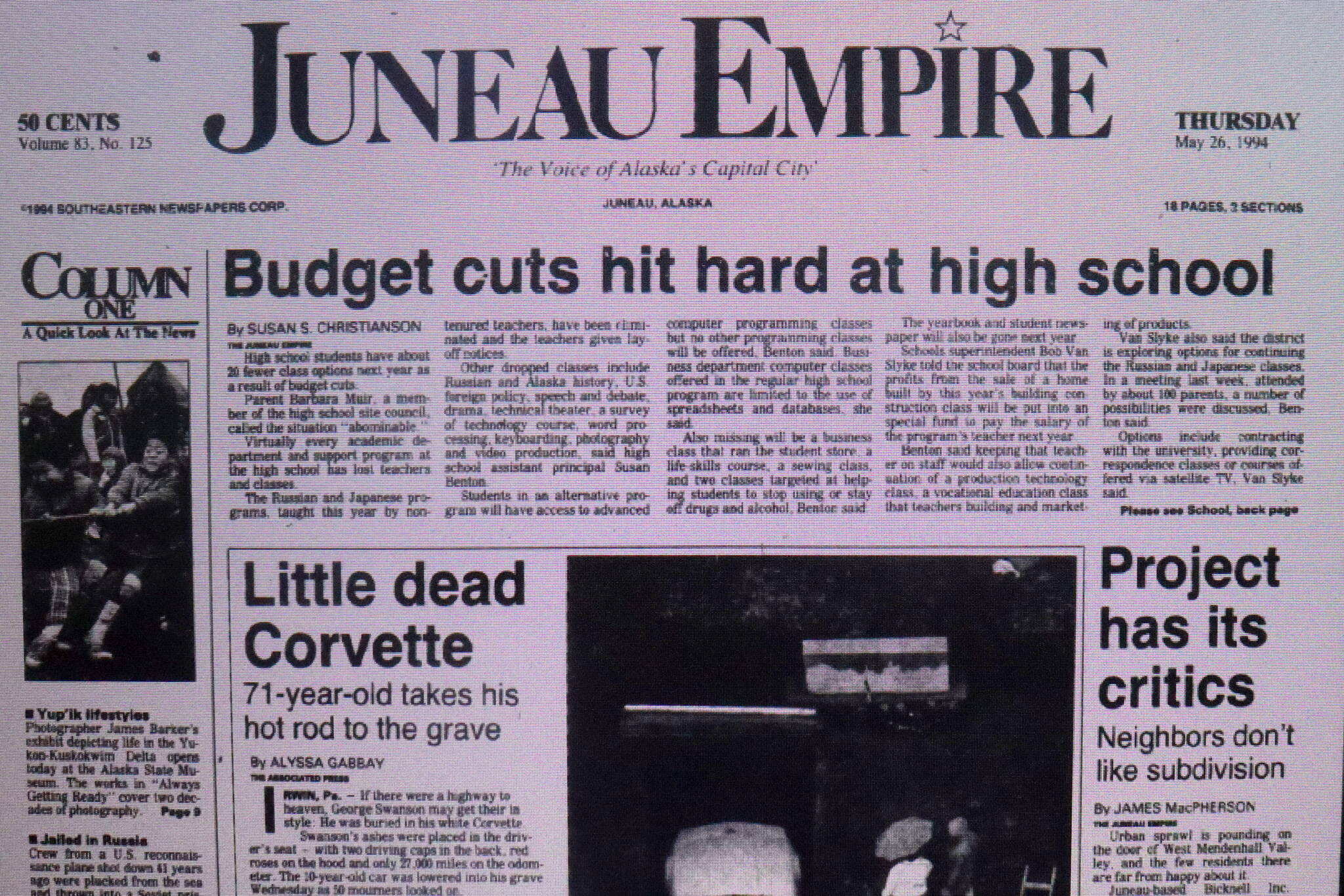Empire Archives is a series printed every Saturday featuring a short compilation of headline stories in the Juneau Empire from archived editions in 1984, 1994 and 2004.
This week in 1984, At 6:15 a.m. House Speaker Joe Hayes, R-Anchorage, brought down the gavel ending the second session of the 13th Alaska Legislature for the House of Representatives, 144 days after it began. The Senate, however, is still in session. Adjournment in the House came after an all-night session that saw a flurry of bills passed and billions of dollars spent. Tired lawmakers and their staff appeared relieved by the time it was over. Action began early Wednesday evening in the House Finance Committee when chairman Al Adams, D-Kotzbue, announced the appropriations bill had been “amended slightly.” In fact, several capital project bills and loans were lumped into the measure, which totaled about $913 million for next year and about $2.4 billion over the life of the appropriations. Meanwhile, sifting through the remains of the all-night House floor session, Alaska senators postponed further action for a day to unravel “just what the House did,” according to leaders in the that chamber.
This year the Senate adjourned by the mandatory 121-day limit while the House was the chamber that stalled — but only for about 80 minutes past midnight in passing a rush of bills and dragging about debate on one that failed.
Original Story: “All night long: House brings down final gavel as senators remain in session,” by Kirk McAllister. 5/31/1984.
This week in 1994, high school students have about 20 fewer class options next year as a result of budget cuts. Parent Barbara Muir, a member of the high school council, called the situation “abominable.” Virtually every academic department and support program at the high school has lost teachers and classes. The Russian and Japanese programs, taught this year by a non-tenured teacher, have been eliminated and the teachers given layoff notices. Other dropped classes include Russian and Alaska history, U.S. foreign policy, speech and debate, drama technical theater, a survey of technology course, word processing, photography and video production, said high school Assistant Principal Susan Benton. Students in an alternative program will have access to advanced computer programming classes, but no other programming classes will be offered, Benton said. Business department computer classes offered in the regular high school program are limited to the use of spreadsheets and databases, she said.
Today the Juneau School District is still determining the impacts of a consolidation plan that will combine the two high schools and two middle schools into one school each. Officials say the larger school sizes should make a more diverse range of classes available within each building, but the district is also currently planning to lay off dozens of teachers and increasing class sizes. Also, some facilities at specific buildings won’t be available at the consolidated sites. Some decisions about staffing in particular will depend on if Gov. Mike Dunleavy vetoes some or all of a one-time increase in per-student funding.
Original Story: “Budget cuts hit hard at high school,” by Susan S. Christianson. 5/26/1994.
This week in 2004, the count of questioned and absentee ballots Friday afternoon didn’t change the results of the special election, in which voters passed an initiative to block construction of the Dimond Park high school. The new totals are 4,391 yes votes and 4,156 no votes. The 8,551 ballots cast represent a 36.61% turnout of registered voters. The margin of victory was 51.3% to 49.7%. The turnout is much higher than the 5,647 votes cast in the June 2003 special election for school bonds, and is not much less than the 9,633 votes cast in the October 2004 general election, which included a mayoral race. The Juneau Assembly and Juneau School Board are scheduled to meet next week to discuss what the next steps should be. The city faces a Dec. 31 deadline from the state Department of Education if the city wants reimbursement for 60% or 70% of a school project’s bonded cost. The city has sold but not used $18.15 million in bonds for the Dimond Park high school. Those bonds can be applied to other school projects. But City Attorney John Hartle has said any new use of the bonds should be approved by voters.
Today what became Thunder Mountain High School held its final graduation ceremony last weekend before students are consolidated into Juneau-Douglas High School: Yadaa.at Kalé starting next fall.
Original Story: “More ballots, same result” by Eric Fry. 5/30/2004.
• Contact Mark Sabbatini at mark.sabbatini@juneauempire.com or (907) 957-2306.

